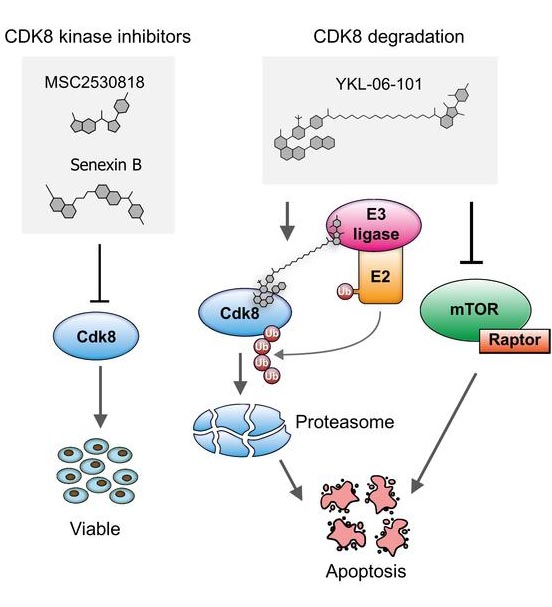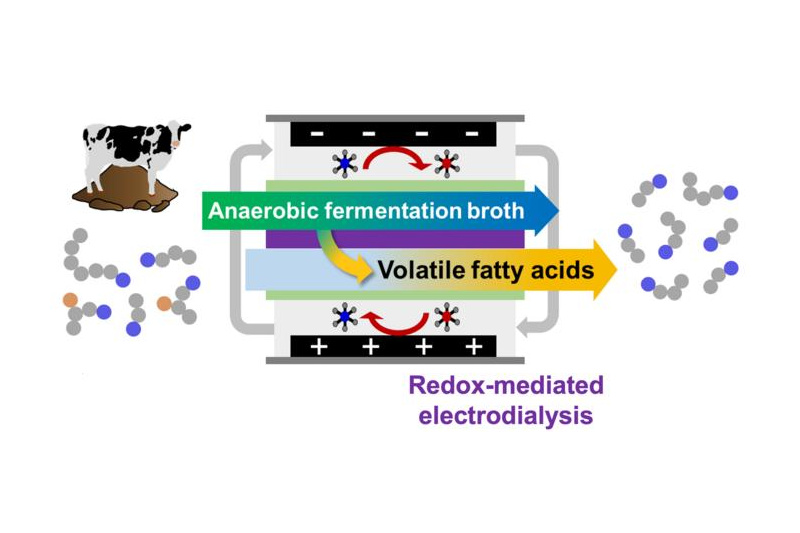

Concept of a dual degrader
Ingeborg Menzl/Vetmeduni Vienna
During their search for new therapeutic options for acute lymphoblastic leukaemia (ALL), a team of researchers at Vetmeduni Vienna have discovered a new function for a special enzyme, cyclin-dependent kinase 8 (CDK8), as part of the signalling system in ALL.
Most important for future therapies is the presence of a therapeutic window: healthy blood cells are not affected by the absence of CDK8, while the leukaemic cells need CDK8 to survive.
Using leukaemia mouse models, first author Ingeborg Menzl from the Institute of Pharmacology and Toxicology at Vetmeduni Vienna and her colleagues demonstrated that CDK8-deficient leukaemia cells show an increase in cell death.
“Of note is that the function of CDK8 in ALL is independent of enzymatic activity, which means that conventional kinase inhibitors are ineffective,” says Menzl. Based on this finding, the research team asked for potential interaction partners and discovered a previously unknown link between CDK8 and the mTOR signalling pathway in cancer cells.
Dual degrader – a therapy line with combined effect
In collaboration with the research team of Nathanael Gray from the Harvard Medical School, the researchers used a new generation of drugs that do not block enzymatic activity but induce the degradation of proteins (called PROTACs). In this way, it was possible to kill two birds with one stone, as senior author Veronika Sexl, the director of Institute of Pharmacology and Toxicology at Vetmeduni Vienna, explains:
“Using a newly synthesized PROTAC, a small molecule we have called YKL-06-101, mTOR signalling is blocked while simultaneously degrading CDK8. This represents a novel therapeutic line in drug development: a single drug is enough to degrade one molecule, CDK8, while simultaneously blocking a signalling pathway enzymatically.” With this concept of a dual degrader, the researchers are pioneering for future cancer therapies.
A complement to the drugs currently in use
Acute lymphoblastic leukaemia (ALL) is caused by an uncontrolled proliferation of immature lymphocytes. This, in turn, can be caused by genetic alterations resulting in gene products such as the oncoprotein BCR-ABL.
Although patients have benefited from the development of imatinib, a tyrosine kinase inhibitor, relapses occur. To guarantee therapeutic improvements it is essential to understand how the oncoprotein BCR-ABL affects cell signalling. The present study by Vetmeduni Vienna is an important contribution in this direction.
Service:
The article “A kinase-independent role for CDK8 in BCR-ABL1+ leukemia” by Ingeborg Menzl, Tinghu Zhang, Angelika Berger-Becvar, Reinhard Grausenburger, Gerwin Heller, Michaela Prchal-Murphy, Leo Edlinger, Vanessa M. Knab, Iris Z. Uras, Eva Grundschober, Karin Bauer, Mareike Roth, Anna Skucha, Yao Liu, John M. Hatcher, Yanke Liang, Nicholas P. Kwiatkowski, Daniela Fux, Andrea Hoelbl-Kovacic, Stefan Kubicek, Junia V. Melo, Peter Valent, Thomas Weichhart, Florian Grebien, Johannes Zuber, Nathanael S. Gray and Veronika Sexl was published in Nature Communications.
https://www.nature.com/articles/s41467-019-12656-x
About the University of Veterinary Medicine, Vienna:
The University of Veterinary Medicine, Vienna in Austria is one of the leading academic and research institutions in the field of Veterinary Sciences in Europe. About 1,300 employees and 2,300 students work on the campus in the north of Vienna which also houses five university clinics and various research sites. Outside of Vienna the university operates Teaching and Research Farms. The Vetmeduni Vienna plays in the global top league: in 2019, it occupies the excellent place 5 in the world-wide Shanghai University veterinary in the subject “Veterinary Science”. http://www.vetmeduni.ac.at
Ingeborg Menzl
Institute of Pharmacology and Toxicology
University of Veterinary Medicine Vienna (Vetmeduni Vienna)
T +43 1 25077-2900
Ingeborg.Menzl@vetmeduni.ac.at
https://www.nature.com/articles/s41467-019-12656-x
https://www.vetmeduni.ac.at/en/infoservice/press-releases/press-releases-2019/ac…












